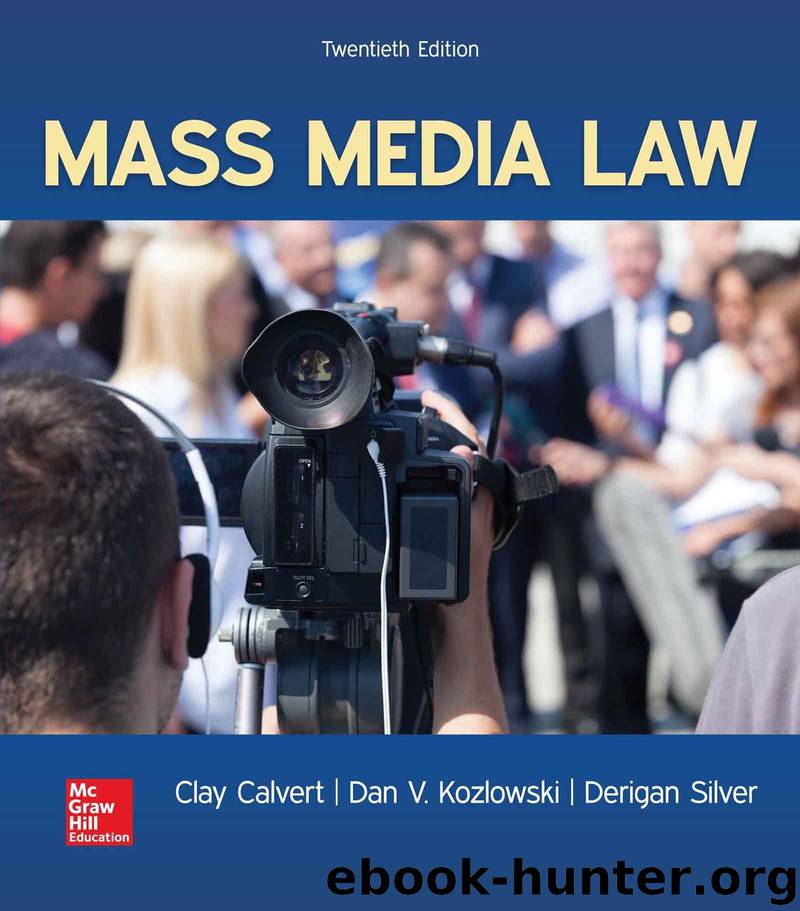Mass Media Law by Don Pember

Author:Don Pember [Pember, Don]
Language: eng
Format: epub
Publisher: McGraw-Hill Higher Education
Published: 2017-10-17T00:00:00+00:00
substantial changes being enacted in 1974, 1976, 1986, 1996, 2002 (with the adoption of the Homeland Security Act), 2007 and 2016.
What Is an Agency?
The U.S. Freedom of Information Act gives any person access to all the records kept by all federal agencies, unless the information falls into one of nine categories of exempted material. An agency has been defined under the law as
any executive department, military department, government corporation, government-controlled corporation or other establishment in the executive branch of government (including the executive office of the president), or any independent regulatory agency.
The law governs records held by agencies in the executive branch of government and all the independent regulatory agencies like the Federal Trade Commission (FTC), the Federal Aviation Agency, the Nuclear Regulatory Commission, the Social Security Administration and the Securities and Exchange Commission. The law does not cover records held by Congress or the federal courts. Some agencies associated with the executive branch of government also fall outside the purview of the law. In 1985 the U.S. Court of Appeals for the District of Columbia Circuit ruled that the Council of Economic Advisors, which works closely with the president on economic matters, is not covered by the law because it exists solely to advise and assist the president and makes no policy on its own. The agency has no regulatory power; it cannot issue rules or regulations. Although FOIA does govern some operations in the executive office of the president, the law does not reach “the president’s immediate personal staff or units in the executive office whose sole function is to advise and assist the president,” the court ruled.72
The law does not cover records held by Congress or the federal courts.
A couple of quasi-governmental entities raise interesting questions as to whether they are agencies subject to FOIA. The Smithsonian Institution in Washington, D.C., for instance, is not a government agency and is not subject to FOIA, even though the vast majority of its budget comes from taxpayer dollars. After financial scandals and spending problems rocked the museum, however, a bill was introduced in Congress in 2008 to make it a government agency. To address these concerns and to fend off legislation, the Smithsonian responded in November 2008 by holding what The New York Times described as its “first public board meeting in its 162-year history . . . as part of its new commitment to openness and accountability.”73 The Smithsonian also formally adopted in January 2009 a new policy, patterned after FOIA, to allow for the disclosure of more records.
In contrast to the Smithsonian, the U.S. Postal Service is considered a government agency and features its own FOIA Web site at http://www.usps.com/foia. Although Amtrak (the National Railroad Passenger Corporation) is a private corporation operated for profit and is not technically a government agency, it too is subject to FOIA, under
350
Download
This site does not store any files on its server. We only index and link to content provided by other sites. Please contact the content providers to delete copyright contents if any and email us, we'll remove relevant links or contents immediately.
Cecilia; Or, Memoirs of an Heiress — Volume 1 by Fanny Burney(31324)
Cecilia; Or, Memoirs of an Heiress — Volume 3 by Fanny Burney(30928)
Cecilia; Or, Memoirs of an Heiress — Volume 2 by Fanny Burney(30885)
The Great Music City by Andrea Baker(21195)
We're Going to Need More Wine by Gabrielle Union(18066)
Bombshells: Glamour Girls of a Lifetime by Sullivan Steve(13101)
Pimp by Iceberg Slim(12923)
All the Missing Girls by Megan Miranda(12740)
Fifty Shades Freed by E L James(12443)
Norse Mythology by Gaiman Neil(11875)
Talking to Strangers by Malcolm Gladwell(11863)
Crazy Rich Asians by Kevin Kwan(8342)
Mindhunter: Inside the FBI's Elite Serial Crime Unit by John E. Douglas & Mark Olshaker(7829)
The Lost Art of Listening by Michael P. Nichols(6464)
Enlightenment Now: The Case for Reason, Science, Humanism, and Progress by Steven Pinker(6403)
Bad Blood by John Carreyrou(5761)
The Four Agreements by Don Miguel Ruiz(5502)
Weapons of Math Destruction by Cathy O'Neil(5031)
We Need to Talk by Celeste Headlee(4862)
